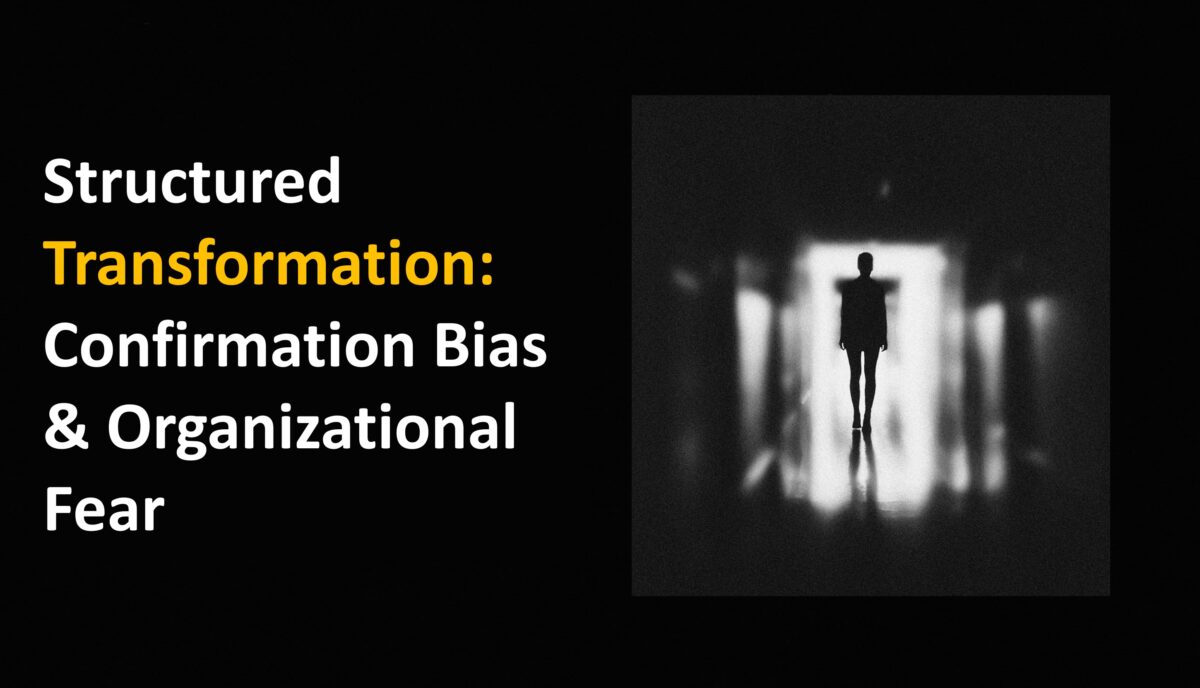“Why do smart companies make dumb mistakes?” Too often, it’s not the market or the competition that derail transformations—it’s the way decisions are made inside the business.
Two silent killers stand out:
- Confirmation bias — leaders favor information that supports their assumptions, ignoring or rationalizing away contradictory data.
- Organizational fear — employees avoid speaking up because they fear rejection, career risk, or being labeled as “not a team player.”
Put them together, and you get a toxic loop: dissent is muted, flawed assumptions persist, and transformation programs stall—or fail.
Real-World Examples
Nokia: The Curse of Agility
At its peak, Nokia dominated mobile phones. But a study by the University of Jyväskylä & Aalto University found that leadership clung to its aging Symbian platform even as evidence mounted that it was no longer competitive.
- Internal warnings about usability and developer attrition were downplayed.
- Competing OS initiatives were underfunded or delayed.
- Leaders believed brand power alone would carry them.
Organizational fear kept critical voices muted. By the time the company acknowledged reality, the market had moved on. Nokia’s dominance evaporated almost overnight.
Revlon / Elizabeth Arden: ERP Gone Wrong
After acquiring Elizabeth Arden, Revlon consolidated onto a new SAP S/4HANA system. The strategy promised synergies and efficiencies. The reality? Disrupted production, missed orders, reputational damage.
- Early warnings about process mismatches were ignored.
- Leaders underestimated the complexity of training and adoption.
- Confirmation bias told management “we’ve done ERPs before, this will be straightforward.”
The fallout was severe: financial losses, lawsuits, and a tarnished brand.
Why This Matters in Transformation
In high-stakes programs—post-merger integration, carve-outs, ERP rollouts, or restructuring—speed and clarity are everything. But:
- Unchecked assumptions → blind spots that waste time and money.
- Delayed recognition → much higher costs to correct later.
- Fearful silence → risks hidden until it’s too late.
- Eroded trust → when programs fail, stakeholder confidence collapses.
What Leaders Can Do (Playbook)
Confirmation bias doesn’t happen overnight. It creeps in. Quietly. And by the time you notice, your program is already drifting.
Here are the early warning signals I encourage leaders to watch for:
🔸 One-sided data decks — the upside shines, but the risks are buried.
🔸 Silent rooms — no dissent, no debate, no fresh thinking.
🔸 Premature “success” stories — big declarations, thin evidence.
🔸 Ignored red flags — rising churn, cost creep, or delays excused away.
🔸 Hero projects, no Plan B — when alternatives are dismissed out of hand.
🔸 “We already knew that” syndrome — surprises reframed as expected all along.
Always watch the room: If Management stops hearing bad news, the bias is already at work.
And here’s how to break the bias–fear cycle:
- Force contrarian data in → red-team reviews, devil’s advocates, “kill the idea” sessions.
- Make dissent safe → leaders ask “What are we missing?” first, not last.
- Pre-commit to tripwires → define signals in advance that trigger reassessment.
- Capture evidence → decision logs showing what was considered, what was ignored, and why.
- Pilot before scaling → learn fast, adjust, then roll out.
- Lead by example → senior leaders admitting uncertainty and course-correcting openly.
My Perspective
As someone who designs and leads transformation programs, I’ve seen these dynamics play out many times. The lesson is clear: awareness alone isn’t enough—you need structured safeguards that make it hard for bias and fear to take over.
The companies that succeed aren’t the ones that avoid mistakes entirely. They’re the ones that spot them early, course-correct quickly, and keep the organization aligned and engaged.
If this resonates, and you want to shape your program—or just exchange ideas— drop me a message either via email diethard.engel @ de-mcs.de or connect with me on LinkedIn.
